
Engage Your Managers to Support Well-Being and Benefits Efforts
Managers have long played key roles in organizations, affecting everything from employee engagement to organizational performance, and the pandemic has only reaffirmed the crucial role they play. Today’s organizations are leaning on their managers more than ever before. But as managers deal with the stress of their workers they’re also dealing with their own stress. In the first year of the pandemic, Reetu Sandhu, senior manager of research at Limeade, said they “saw that managers feel a great deal of pressure and responsibility for their teams and how they're doing, and that managers continue to be looked to as a source of support."1
As workers’ well-being remains a top priority, ensuring that managers have the training and information they need to support their people will continue to be critical, especially as organizations continue to evolve their working arrangements—in some cases, allowing people to split time between worksites and home.
To remain successful in their roles, managers need consistent training and the tools to do their jobs well. Employees’ needs are ever-changing, and managers need to keep up; the last year and a half are a prime example of these changing needs. Mental health and burnout are common issues workers may need to discuss with their managers. Many workers need to spend more time during the workday with family members and will need help from managers to navigate leave policies and find work coverage.
We’ve been doing more manager communication and education than ever before. Here are 5 examples from our clients that are helping their managers succeed and providing them new ways to support their teams.
1. Provide Dedicated Resources
Managers need easy-to-find tools and resources. Krispy Kreme knew their benefits website was the perfect channel for this and created a dedicated section for manager tools. This means their managers, who are spread across the country at fast-paced doughnut shops, don’t have to hunt for key information or go through complex logins to access top benefits info. The toolkit includes easy-to-understand information on leaves and employment verification along with quick tips on how to address personal or work-related issues.
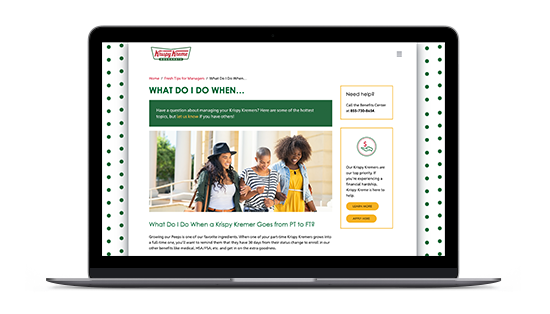
Krispy Kreme benefits website with dedicated section for manager’s tools.
2. Promote Benefits Learning Just Like the Rest of Your Training Opportunities
Many of your providers likely offer webinars on a range of topics, like the basics of the EAP—what it is, how to use it, where to find mental health awareness resources, and more. Make sure you draw attention to the wealth of resources you offer that may be particularly useful to managers. Lenovo includes manager-specific events, in addition to those for all employees, on their benefits website.
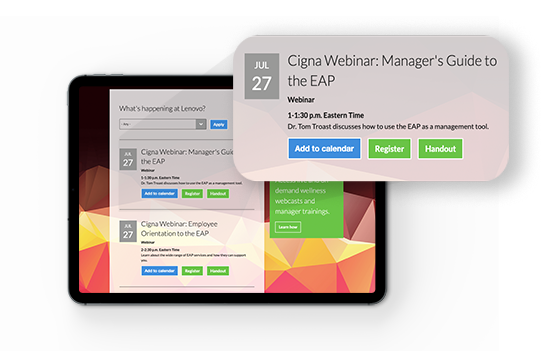
Lenovo benefits website promoting manager-specific and employee events.
3. Communicate Regularly
Monthly emails with manager-focused events, updates, and tips provide timely information to help managers navigate priorities.
In 2020, our own Segal colleagues created a monthly manager newsletter called “The Beat.” It includes topics on how to make meetings more productive, prepare for goal-setting discussions with direct reports, and become an expert at remote leadership. A quick survey after the first issue was distributed found that 92% of readers found the newsletter helpful.
4. Script the Conversation
Last year, Lenovo recognized that their managers were struggling with their own mental health while supporting their employees’ needs too. They asked us for help, so we created a series of manager tip sheets that direct managers to resources, provide conversation starters on tough topics, and teach them how to recognize whether their people are struggling. Each is distributed with a manager-dedicated email highlighting what managers will find in the tip sheet.
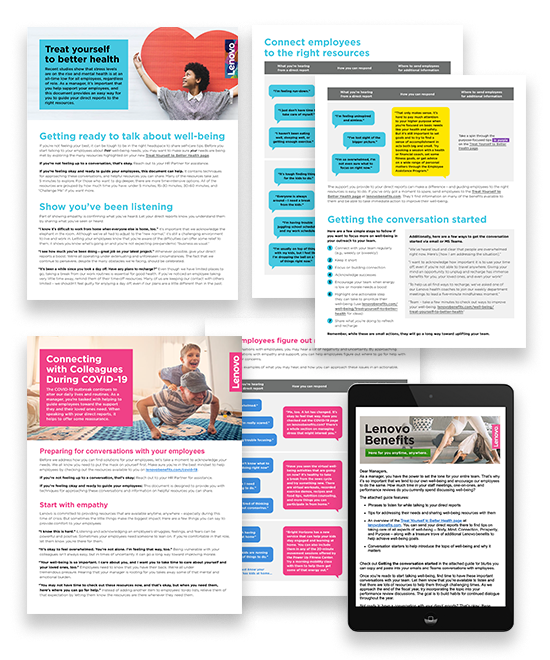
Manager tip sheets with scripted conversation starters.
5. Break Down Complex Topics
Offer short training sessions on your benefits, so your managers become benefits ambassadors. If your managers use your EAP (or any benefits you offer), they’re more likely to encourage their people to do the same.
Tip sheets and talking points can help here too. These will be especially important as we move to hybrid work scenarios where it becomes more complex to manage who’s at home and who’s in the office. We love the flexible work arrangement tip sheets we created for a renowned science, technology, and research institute. Each illustrates a possible work schedule based on six personas with unique home and working situations, helping managers understand different ways to flex schedules and work time during COVID.
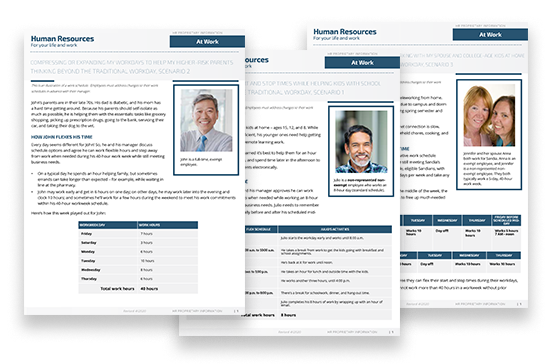
Break down complex topics with a series of tip sheets and talking points.
We also created parental leave guides for Lam Research, outlining the manager’s role, so that both manager and employee know what to expect.
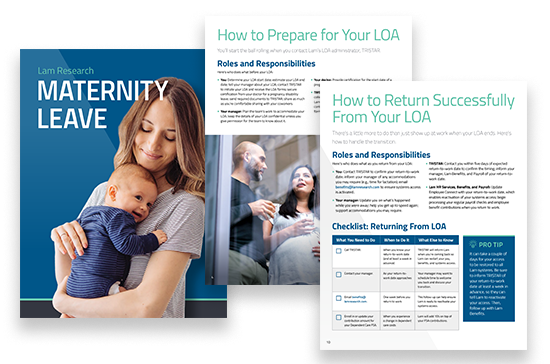
Lam Research parental leave guides outlining the manager’s role.
Helping Managers Too
Your managers are likely feeling many of the same stresses that their people are experiencing, which can be compounded as they offer support to others. Be sure they know who to go to for help, and encourage them to take time off to recharge.
When it comes to employee happiness, managers play a big role there too. Relationships with management are the top factor in employees’ job satisfaction. And if managers feel supported, they are more likely to pass that support down the line to their people. Happy employees lead directly to higher performance and your organization’s bottom line. Successful managers are the driving force behind your employees' opportunity to thrive.
We're proud to work with organizations that value their people. If you want to learn more, we’d love to talk.
1 Wilkie, Dana. (2020, October 22). “Workers’ Mental Health Suffers During the Pandemic: How Managers Can Help.”
Read Next
Work with Us
We partner with organizations that value their people first. Let’s talk.

Caroline Lowry, VP Senior Project Manager, has been part of the Segal Benz team since 2006 and currently manages some of our largest engagements.
